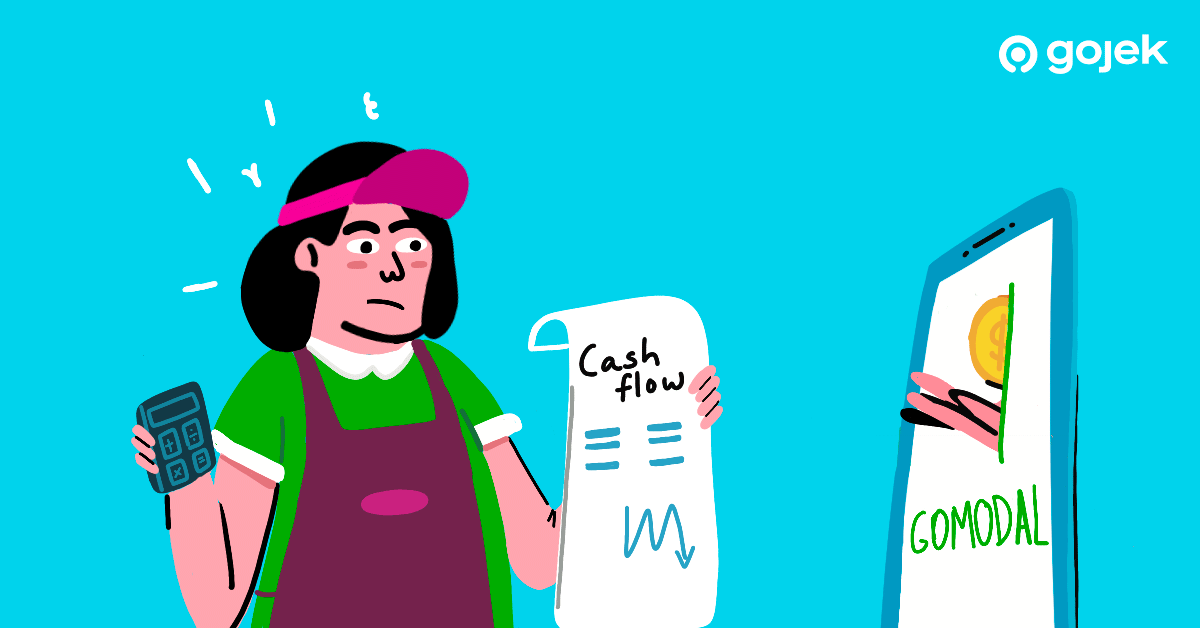Helping our Helpers with GoModal
The story of how we built a product to help our merchant partners power through short-term capital needs.

By Sooraj Rajmohan
Amalia runs a small salad shop in Jakarta — the kind that serves creamy concoctions topped with freshly cut fruits. Strawberries are one of her most popular toppings.
Recently, she decided not to buy strawberries. The prices were too high and she couldn’t afford them anymore.
As the operator of GoFood, one of the largest food delivery services in the world, the wellbeing of merchant partners is paramount to us at Gojek. Many of our 400,000 partners, like Amalia, routinely encounter financial bottlenecks due to unexpected expenses or improper revenue management.
For a significant percentage of partners, bookkeeping is still a foreign concept, with the order info provided by GoFood serving as their main marker for sales and revenue. They tend to go with the flow of the business, not planning on scaling up or battening the hatches for a rainy day.
As another merchant partner puts it, “I never think much about money, I just leave it to the Almighty.”
The health of our business is only as good as the health of the businesses we work with. So we embarked on a journey to help merchants with their capital woes by building a new financial service product.
This is how we built GoModal.
Trials and tribulations
When the going gets tough, merchant partners usually have three options: borrow from a relative, approach a bank, or cut down on living expenses.
In Indonesia, the idea of taking a pinjaman (loan) is still frowned upon. Even if the capital requirement is to help tide over a temporary crisis or business expansion, merchants are hesitant to approach family for this reason. As many do not possess solid credit scores, traditional bank loans are difficult to come by as well. This led to many partners pulling from savings and cutting down on expenses — forgoing even daily essentials to keep business going.
This wasn’t an experience we wanted our partners to have. Something had to be done.
Gojek’s first attempt to solve this involved a tie-up with one of Indonesia’s largest banks to offer our merchant partners subsidised business credit. While we had the right idea, we had not solved the underlying issues — partners would rarely pass the stringent disbursal criteria of a commercial bank, and disbursal timelines would not suit their need for immediate capital.
In bad times, rapid capital infusion could make the difference between a business sinking or floating.
We decided to try a different approach.
We’re in this together
In late 2018, we began offering working capital loans to our merchant partners. By the next year, Gojek’s erstwhile merchant app, GoResto, had been overhauled into GoBiz, a comprehensive Super App built to cater to all the needs of merchant partners. In September 2019, we added our loan feature to GoBiz’s merchant dashboard.
We called this Pinjaman Modal Usaha (PMU). In other words, a ‘venture capital loan’.
As the payments of partners who had signed up for GoBiz was processed by us, we could figure out their revenues and repayment capacity ourselves. This put Gojek in the perfect position to offer working capital, made collections simple, and further reinforced the trust partners had in us.
The capital need was slowly being addressed. The latter half of 2019 saw us disburse capital to over 4,500 merchants. 🙌
But one problem bothered us. We still weren’t fast enough.
From pinjaman to modal
With PMU, Gojek had successfully addressed part of our partners’ capital woes. But PMU still relied on a rudimentary form to collect applications, tracking via spreadsheets, and manual approval processes.
The first step was a small one, automating parts of the verification and processing.
Next, we built out a complete credit cycle.
Then, we got rid of the spreadsheets.
We now had a complete product that could figure out how much capital could be given to which merchant, process applications almost instantly, and systems that could handle disbursal and recovery.
As the final cherry (or strawberry 😉) on top, we decided our improved product could use an improved name. A Gojek name.
Remember the negative connotation associated with the word pinjaman? We weren’t giving our partners loans. We were giving them capital. Modal.
And so was a new product born — GoModal.
What does it do?
Now that we had a product that could do everything we envisioned, it was time to get it out front and centre. Not a lot of merchants manually accessed the GoBiz dashboard, so in January 2020, we put GoModal in a place where we sure everyone would see it.
The GoBiz app.
Using GoModal, eligible merchant partners can avail pre-approved working capital between Rp1.5m ($90) to Rp150m ($9,000) with repayment tenures ranging from 2 to 12 months.
Remember we mentioned we could now disburse capital faster?
Relying on a bank for capital leads to processing time of up to 6 weeks. With GoModal, we get money to the bank accounts of our partners in 13 hours. 💪
Since our partners are now busy fighting fires and expanding business, we figured it wasn’t fair to hassle them with big monthly repayments. As their earnings are processed by GoBiz, we deduct payments from their daily earnings up to 20 days a month, assuming they generated enough revenue.
GoFood is built by the grit and ingenuity of our partner merchants, and running a business is hard enough without having to constantly worry about capital. That’s why we went on the journey to build GoModal.
So people like Amalia never have to worry about buying strawberries again.

Want more of content like this? Sign up for our newsletter!
